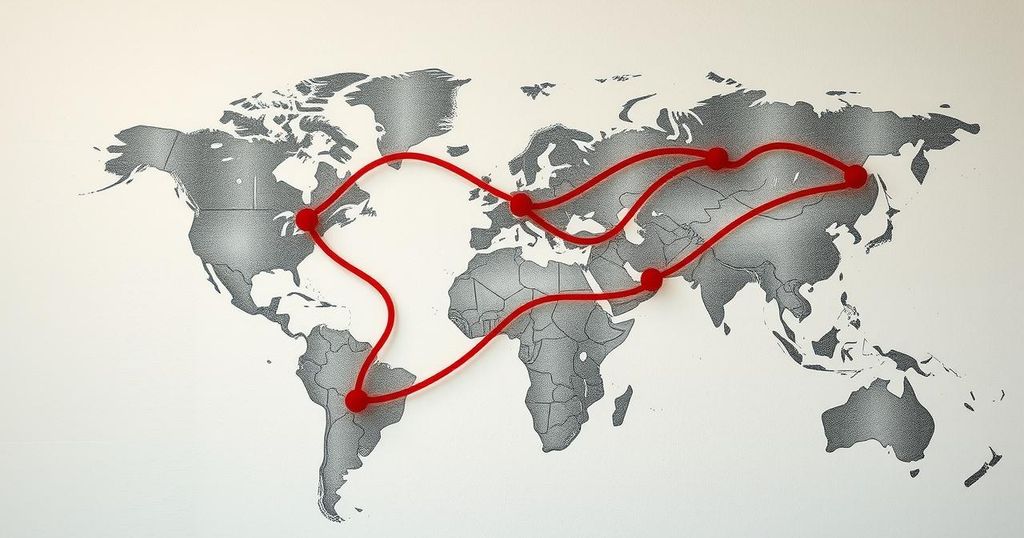Israeli Prime Minister Netanyahu signals commitment to Trump’s proposal for relocating Palestinians from Gaza, advocating it as the only viable future. Secretary of State Rubio supports Israel’s military objectives but anticipates resistance from Arab leaders concerning the plan. As ceasefire negotiations stall, the complexities of hostages, geopolitical tensions, and humanitarian implications continue to overwhelm discussions about Gaza’s future.
Israeli Prime Minister Benjamin Netanyahu recently indicated a commitment to advancing U.S. President Donald Trump’s controversial proposal regarding the relocation of Palestinians from Gaza. During discussions with Secretary of State Marco Rubio, who supports Israel’s military objectives against Hamas, Netanyahu described the plan as the only feasible solution for transforming the region’s future.
Rubio’s Middle East visit, which includes stops in Saudi Arabia and the UAE, may encounter resistance from Arab leaders concerning the proposal, which also calls for U.S. oversight of Gaza’s redevelopment. Though Netanyahu insists that any movement from Gaza would be voluntary, critics view the current conditions as coercive following widespread devastation in the territory.
Emphasizing a mutual strategy with Trump, Netanyahu asserted that unless Hamas frees the captives taken during their recent offensive, the situation could deteriorate further. The proposed ceasefire’s first stage concludes soon, with discussions on the next phase stalled, including conditions for a potential exchange of hostages.
Trump’s envoy Steve Witkoff affirmed their engagement in continuing discussions about the second phase of the ceasefire, stating productive conversations have occurred with multiple parties involved. Reports indicate that the hostages include 19 Israeli soldiers, all presumed alive, while Netanyahu is set to convene his cabinet to deliberate next steps.
Additionally, the resumption of U.S. munitions shipments to Israel suggests a preparation for renewed military engagement, although such actions threaten the lives of remaining hostages. Rubio argued that a lasting peace is unachievable while Hamas remains a significant governing force in the region, advocating for its eradication.
Israel has extended an ultimatum to Hamas, proposing a plan including the exile of its leaders, which Hamas has rejected, insisting on Palestinian self-governance. As diplomats prepare for discussions in Cairo regarding ceasefire execution, incidents of violence continue to occur, highlighting the ongoing tensions in Gaza.
Rubio’s statements have also implied that Arab countries must take decisive actions against Hamas; his absence from meetings with Palestinians, however, may hinder productive dialogue. Arab leaders face challenging choices, as facilitating the relocation of Palestinians risks severe backlash domestically, threatening regional stability.
Egypt, wary of the consequences of a mass influx of Palestinian refugees, is leading efforts to generate an alternative proposal focused on Gaza’s reconstruction without displacing its residents. Arab nations have conveyed their unwillingness to endorse any plans that do not acknowledge a pathway to Palestinian statehood within the broader context of the region’s complexity.
Netanyahu’s administration has consistently dismissed the possibility of a Palestinian state and any role for the Palestinian Authority in Gaza, complicating the prospects for future negotiations. The landscape remains fraught with geopolitical tension, as U.S. funding might be withheld from cooperating nations, further heightening the stakes amid ongoing conflict in the region.
This situation underscores the complicated interplay of regional politics, humanitarian concerns, and the quest for peace, with implications that resonate far beyond the immediate locale.
In summary, Israeli Prime Minister Netanyahu is moving forward with Trump’s contentious plan to transfer Palestinians from Gaza, asserting its necessity for regional progress. Secretary of State Rubio’s support further complicates dynamics with Arab leaders who resist population displacement. As ceasefire negotiations falter and tensions escalate, the risk of renewed conflict looms, placing hostages in peril and complicating the prospect of peace in a deeply fragmented region.
Original Source: www.pbs.org




